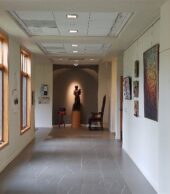Divine Sparks
Kindling the Fires of Ministry
Dr. Barbara Sutton, Director of Ministerial Formation and Field Education and a member of the faculty at Saint John’s School of Theology and Seminary, was a visiting scholar with the Benedictine Center for 2017-2018. This reflection follows Dr. Sutton’s webinar by the same title, available online.
Divine Sparks is just one image that reminds people of the divine call to minister to all God’s people on behalf of the church. The zeal and passion that ministers experienced as they cross the threshold of their first assignment help them take on the mantel of servanthood.
Re-Igniting the Imagination
Soon these same Christian leaders are telling themselves that eight to twelve-hour days of ministering, creating, caring, teaching, and administering are signs of important needs. Sparks fly! As the friction of ministerial settings press against the best of intentions and stymie our human wisdom, things heat up—value conflicts, breakdowns of community, absence of fairness, lack of control, work overload, and insufficient affirmation. Soon the rules of the game no longer reflect the training textbooks.
Restoring our image of divine sparks—from just flying ones—benefits from re-igniting the imagination within relationship. How might we invite one another into sparked moments and find together a new vision? In creative communities our expressions become contagious as we pollinate one another’s ideas and find new visions emerging. Together, we might even learn to thrive in the midst of adversity and grow in our ability to trust that disequilibrium sometimes transforms our perspective and propels us into new resolutions.
Cultivating a Sacred Gaze
Spiritual practices are important in creative communities. One that brings beauty and light is cultivating a sacred gaze. This holds the possibility of transforming the way we see situations. A sacred gaze is wholly different from a quick glance or averting our eyes in an awkward situation.
It is a particular kind of looking—a steady, intense or absorbed form of vision. It requires pondering, holding the situation lightly and giving it space; turning it over and considering it from various angles. As we do in lectio divina, we ruminate on it. This pondering becomes prayer as the contemplation arises in a mind that is open to God. A sacred gaze allows us to be present to each moment as it unfolds. It allows us to see the situation differently, illuminating our experience with the light of God and the Christian community. It kindles the fires of ministry.
 Learn more about Dr. Barbara Sutton and her upcoming events.
Learn more about Dr. Barbara Sutton and her upcoming events.
Learn more about core Benedictine values.






